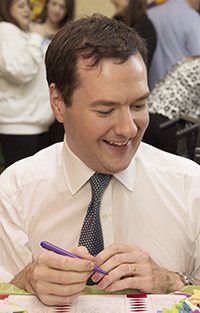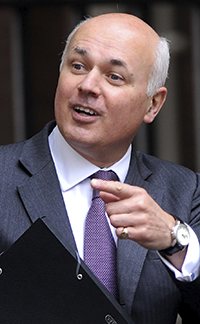Alex Andreou
Monday 30 December 2013
theguardian.com
http://www.theguardian.com/commentisfree/2013/dec/30/2013-year-coalition-climbdown-uturns
----
January: the horsemeat hash heats up
The coalition parties renew their vows in the now infamous "Ronseal" speech then immediately start bickering again. But January was really all about food. There is horsemeat in your burger – although probably not the posh kind George Osborne buys. The government categorically denied that this had anything to do with budget cuts and deregulation. A National Audit Office report in October concluded it was everything to do with budget cuts and deregulation. Meanwhile, minister for public health Anna Soubry reckons she can tell poor people by their weight. Also, she is shocked poor people don't have dining tables. Oh and eating lunch at your desk is disgusting.February: Gove backtracks on the baccy
Having had to abandon his plans for a return to O-levels in September 2012, Michael Gove is forced into an even more humiliating retreat over his proposed English baccalaureates. He still vows to reform GCSEs radically; he just doesn't know exactly how. The auction for the sale of 4G rights yields £1.2bn less than Osborne had anticipated. Only problem is that, in an act of brilliant political manoeuvring, Osborne has already used the money. The loss of Britain's AAA rating a day later hardly came as a surprise, except to Osborne, to whom most things come as a surprise. Meanwhile, in the Eastleigh byelection, the Tories' 11th target seat, they come third behind Ukip. Cue much immigrant bashing by all.March: help is offered to the housing bubble
Jeremy Hunt is forced to rewrite regulations opening up the NHS to further private provider involvement four weeks before they come into effect. Iain Duncan Smith succumbs to pressure and announces a host of exemptions from the bedroom tax three weeks before it is due to come into force. The chancellor (fresh from defending bankers' bonuses in Brussels) delivers a budget which hides disappointing economic figures behind Help to Buy schemes while denying they might fuel a housing bubble. By November, the Bank of England will act to rein in such schemes amid fears they might fuel a housing bubble.April: IDS's budgeting bunkum blows up
On April Fools' Day, most of the coalition's cuts take full effect. Osborne reckons Mick Philpott, convicted that week, is an interesting case study for the state subsidising "lifestyles like that". Duncan Smith reckons he could live on £53 a week. When asked to prove it, the quiet man goes really quiet. Then Margaret Thatcher dies and for a few weeks everything goes soft-focus and mournful. Parliament is recalled for a marathon session of tributes, much to the surprise of the Speaker, who saw such a recall as a reaction to national emergencies only.May: Ukip upsets the immigration cart
Ukip does very well in the local elections, to the detriment of all established parties. The two coalition parties are left particularly bruised by the encounter. David Cameron reacts swiftly by inserting tough talk on welfare and immigration in the Queen's speech, but his implacable backbenchers are not satisfied and press ahead with a private members' bill on an EU in-out referendum. The month ends as it started for the Tories – badly – with Patrick Mercer MP resigning after being embroiled in a "cash for questions" scandal, brought to light by the BBC's Panorama programme.June: George hits the world stage – as Jeffrey

It is revealed that a company controlled by Conservative party chairman, Lord Feldman, gave thousands of pounds in donations to the party, while paying no corporation tax. Kay Sheldon, the Care Quality Commission whistleblower, accuses Andrew Lansley of threatening to sack her. Osborne tries to capture the world stage by making a big presentation on tax avoidance at the G8 summit, but his plan is foiled by Barack Obama referring to him repeatedly as Jeffrey. Jeffrey ends the month with yet another spending review which clobbers welfare and council services, including a plan to make the newly unemployed wait a week before being able to claim benefits.
July: cigarettes and alcohol slide
More coalition wheeling and dealing, with Cameron forced to bring forward plans on tax incentives for married couples to avert yet another backbench revolt, and the Lib Dems reportedly pushing for concessions on the tax-free personal allowance in return. G4S, one of the government's key private partners in the privatisation of criminal justice services, faces a fraud investigation for allegedly overcharging. In need of a drink and a fag, the government scraps plans to introduce minimum pricing for alcohol and softens its attitude on cigarette packaging, amid allegations regarding Lynton Crosby's relationship with tobacco companies.August: Cameron kicks up a stink over Syria
The month is dominated by the Syrian crisis and ends with the biggest blow to Cameron's authority as prime minister. When parliament refuses to vote in favour of future military action, the PM throws his toys out of the pram and rules out any such action for good, even if circumstances change, with huge repercussions across the world. This is a impetuous leader at his irritable worst.September: everyone gets excited about energy
The month starts with two coalition U-turns in two days; on introducing "lowest bidder wins" rules into legal aid contracts and controversial lobbying legislation which, charities claimed, would impact their ability to campaign. It ends with, probably, the single biggest headache for the government this year – Ed Miliband's announcement that he will freeze energy prices should he be elected in 2015. What follows is a dazzling display of accusations that he is a conman, harebrained schemes in response, begging to the big six providers behind the scenes, advice to wear woolly jumpers and crackdowns designed to deflect attention from the story that just will not go away.October: the rules are broken, the rules are changed

Royal Mail shares go on sale at what most commentators thought was the vastly undervalued price of £3.30 each. At the end of December the price is still hovering roughly £2.4bn above the government valuation. After judges decide that the state flouted its own rules by forcing Cait Reilly to work for Poundland, the Department for Work and Pensions spends vast sums of energy and money to fight the decision on appeal, before finally being defeated in the supreme court. Instead of changing the offending conduct, Duncan Smith has already retroactively changed the rules. An honourable mention must go to the environment secretary, Owen Paterson, who accuses badgers of "moving the goalposts" when the pilot cull does not yield the results expected.
November: U-turns are made on U-turns
A new record; three U-turns in three days! These came at the end of the month on payday loans, with the government agreeing to cap the overall cost after years of resistance, proposed leverage ratios designed to make banks financially more stable and finally proposals on plain packaging of cigarettes being miraculously revived. Since this last one is a U-turn on a previous U-turn, experts disagree as to whether an entirely new political manoeuvre needs to be established – the full double spin – but the degree of difficulty was certainly high.December: shuffling the statistics pays off
The chancellor delivers his autumn statement, in which, it turns out, things are going much better than we all thought. Having revised the forecast for 2013 from 2% down to 1.2% last year, then to 0.8% in March, the chancellor was able to revise it back up to 1.4%. For this he was hailed a genius and named "Briton of The Year" by the Times. Cameron is criticised by the judge in the Grillo trial for saying he is in Team Nigella. Having considered a negative advertising campaign to convince Bulgarians and Romanians that the UK really is a horrid place earlier in the year, ministers decide that having Keith "do you love this country?" Vaz man the borders personally is a much cheaper and equally effective alternative.Happy new year, coalition!
If you have any questions about this email, please contact the theguardian.com user help desk: userhelp@theguardian.com.
theguardian.com Copyright (c) Guardian News and Media Limited. 2013 Registered in England and Wales No. 908396 Registered office: PO Box 68164, Kings Place, 90 York Way, London N1P 2AP
No comments:
Post a Comment
Note: only a member of this blog may post a comment.